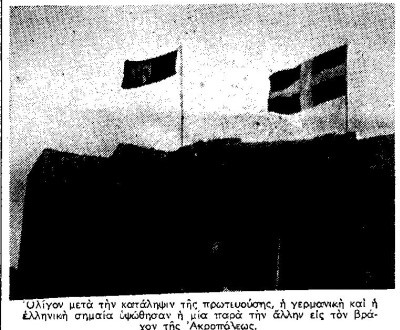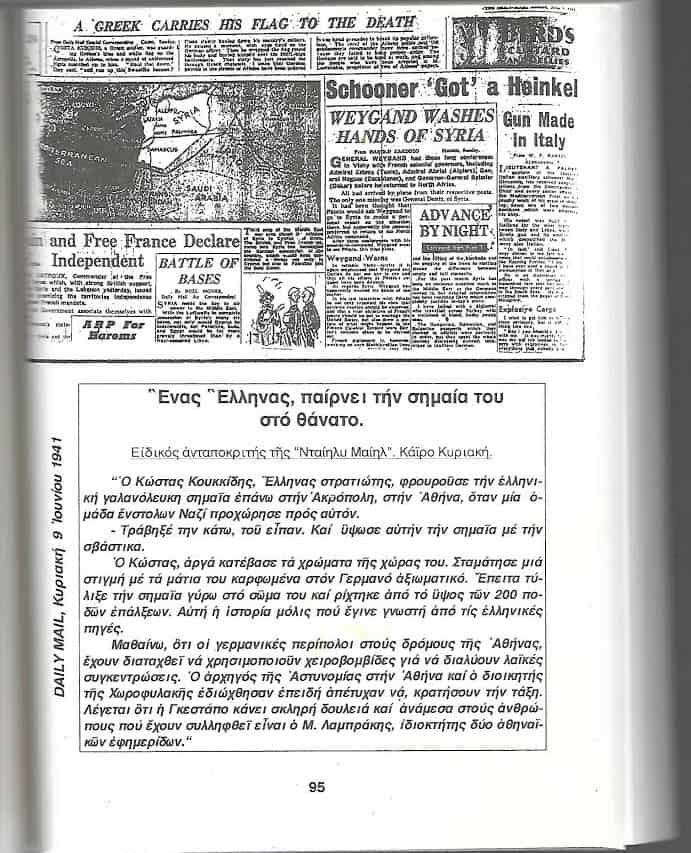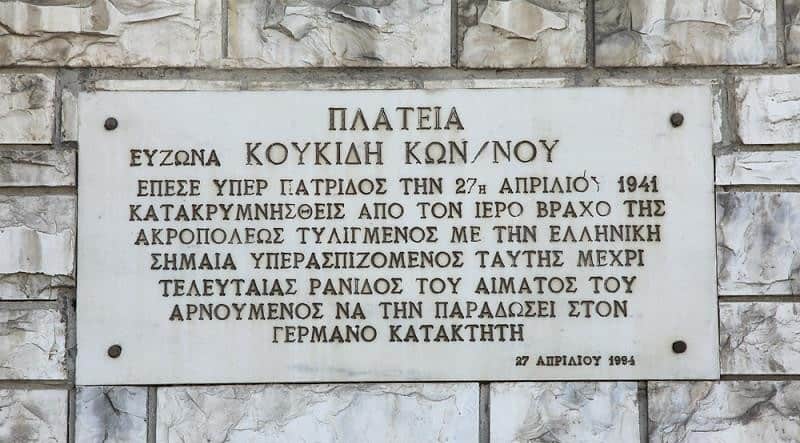It's Sunday, April 27, 1941. A military procession, consisting of two motorcycles, a Kubelwagen and a truck, ascends from Thissio towards the Acropolis. At the Acropolis, the flag is waving high on the pole. The Greek flag with the big white cross in the middle on a blue background.

The soldiers who guarded the flag daily since October 28, 1940, no longer exist! According to the truce terms between Greece and Nazi Germany, there should be no soldiers. An order has already been given for all soldiers to report to the garrison to surrender.

So there are no soldiers to guard the flag. And yet a guard is there! It is the first day he has been assigned this job, and he is very proud. He is only 17 years old and a member of the National Youth Organization. Just yesterday, the local Youth Committee of Thissio decided that its young members perform the duties of the flag bearer until the occupying state decides - with the cooperation of the occupying forces - what would happen next.
He thinks his responsibility is great to protect his country's flag. He had carefully made his uniform from the very early morning, went up to the Acropolis alone, approached the flag, and saluted it. Then he took steps - instinctively - right and left to get to know the place, and then he looked at it again and felt satisfied. From the walls of the Acropolis, he could see German military cars coming and going and slowly people moving around. He also heard the bells of many churches, signifying it was Sunday.
He was anxious about the Germans who had entered Athens and grief for his brother, who had not yet returned from the front lines. However, the waving flag, the eternal Acropolis and the Attic sun warmed his heart.
This person is Konstantinos Koukidis (Κωνσταντίνος Κουκίδης).
At 8:45 a.m., a German detachment led by Captain Jacob and Lieutenant Elsnic had reached the sacred rock of the Acropolis to hoist the German flag.
At that time, the German officers ordered his soldiers to lower the Greek flag. The young Greek could not bear the humiliation of our national symbol. He got the flag, wrapped himself in it and flung himself from the top of the Acropolis on the northeast side of Plaka. He was instantly killed.

The action of Koukidis made a great impression on the Germans, especially their leader, who reported the incident a little later to the Higher Military Administration.
Many say that the sacrifice of Koukidis was the reason the Greek flag was allowed to be displayed, together with the German flag, which is believed to have only happened in Greece and nowhere else in occupied Europe.
It is striking that, while in the early years, there were oral and written testimonies of Koukidis' sacrifice, for about 50 years, this case had been forgotten or silenced. The Germans ardently tried their best to hide this story to try and prevent patriotic fever from the occupied Greeks.
However, eyewitnesses have given their testimonies to the authenticity of this story, and the sacrifice of Koukidis will not be forgotten.

Kyriakou Giannakopoulos, who witnessed the events, gives testimony.
"I, Giannopoulos, a child in the years of the Occupation, remember residents of the area around the Acropolis, talking about the event and a candle with an icon there for the soldier who fell with the flag on the day the Germans came," he said.
And another, Stathis Arvanitis, also a small child, remembers:
"I was seven years old at the time. We lived just below the Acropolis. On that day, April 27 - a sunny day with a very clear sky - my father forbade my brother and mother from leaving the house. I was on the terrace, and I was playing with my car. Suddenly I see a body. They must have been squealing, falling from the Acropolis and hitting the rocks. The Germans didn't believe me," he said.
A commemorative plaque near the spot marks where he died.

A true patriot for Greece.

*More on GCT: On May 30, 1941: Two Greek University students removed the Nazi flag from the Acropolis
Stay updated with the latest news from Greece and around the world on greekcitytimes.com.
Contact our newsroom to share your updates, stories, photos, or videos. Follow GCT on Google News and Apple News.

